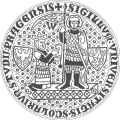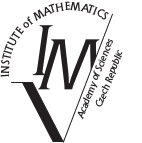Tutorial Track
L. Aurichi: Some games and their topological consequences
Alice and Bob are always playing games. Sometimes Alice plays points and Bob answers with open neighborhoods of the points (Alice wants to force Bob to cover the whole space). Some other times Alice and Bob play things related to density or tightness. Some games are short ($\omega$ innings), some others are longer ($\omega_1$ innings).
We will present some games and discuss the consequences of existence of winning strategies for some of the players.
slides I,
slides II,
slides III
J. D. Hamkins: Set-theoretic potentialism
I shall introduce and develop the theory of set-theoretic potentialism. A potentialist system is a collection of first-order structures, all in the same language $\mathcal{L}$, equipped with an accessibility relation refining the inclusion relation. Any such system, viewed as an inflationary-domain Kripke model, provides a natural interpretation for the modal extension of the underlying language $\mathcal{L}$ to include the modal operators. We seek to understand a given potentialist system by analyzing which modal assertions are valid in it.
Set theory exhibits an enormous variety of natural potentialist systems. For example, with forcing potentialism, one considers the models of set theory, each accessing its forcing extensions; with rank potentialism, one considers the collection of of rank-initial segments $V_\alpha$ of a given set-theoretic universe; with Grothendieck–Zermelo potentialism, one has the collection of $V_\kappa$ for (a proper class of) inaccessible cardinals $\kappa$; with top-extensional potentialism, one considers the collection of countable models of ZFC under the top-extension relation; and so on with many other natural examples.
In this tutorial, we shall settle the precise potentialist validities of each of these potentialist systems and others, and we shall develop the general tools that enable one to determine the modal theory of a given potentialist system. Many of these arguments proceed by building connections between certain sweeping general features of the models in the potentialist system and certain finite combinatorial objects such as trees or lattices. A key step involves finding certain kinds of independent control statements — buttons, switches, ratchets and rail-switches — in the collection of models.
slides
I. Neeman: Higher analogues of PFA
Notes (taken and kindly provided for download by Asaf Karagila)
Research Track
| Speaker | Title | Abstract/Slides |
|---|
| Viera Šottová | wQN-space and ideal coverings of X | slides |
| Taras Banakh | A parallel metrization theorem | abstract slides |
| Serhii Bardyla | On locally compact semitopological graph inverse semigroups | abstract slides |
| Adam Bartoš | Compactifiability and Borel complexity up to equivalence | abstract slides |
| Wojciech Bielas | Separation axiom for regular closed sets | slides |
| Andrew Brooke-Taylor | Products of CW complexes | abstract slides |
| Noé de Rancourt | Approximate Gowers spaces | slides |
| Stamatis Dimopoulos | Cardinal characteristics and strong compactness | abstract slides |
| Monroe Eskew | Rigid collapse | abstract slides |
| Saeed Ghasemi | Almost disjoint families and C*-algebras | abstract slides |
| Michał Tomasz Godziszewski | Truth theories and satisfaction classes over models of set theory | slides |
| Martin Goldstern | Cichoń's Maximum | abstract slides |
| Miha Habič | Surgery and nonamalgability for Cohen reals | slides |
| Eliza Jabłońska | On Steinhaus properties and families of "small" sets | slides |
| Asaf Karagila | TBD | slides |
| Olena Karlova | Almost strongly zero-dimensional spaces | abstract |
| Michał Korch | Special subsets of the generalized Cantor space $2^\kappa$ | abstract slides |
| Ziemowit Kostana | Non-measurability of the algebraic sums of sets of real numbers | abstract slides |
| Wieslaw Kubis | The weak amalgamation property | slides |
| Ondřej Kurka | Large separated sets of unit vectors in Banach spaces of continuous functions | abstract slides |
| Marta Kwela | Ideals of nowhere dense sets in some topologies on integers | slides |
| Adam Kwela | Ideal weak QN-spaces | slides |
| Maxwell Levine | Forcing Square Sequences | abstract slides |
| Marcin Michalski | Luzin and Sierpiński sets meet trees | abstract slides |
| Heike Mildenberger | Block Sequences with Projections into a Sequence of Happy Families | abstract slides |
| Kaethe Minden | Subcomplete Forcing, Trees, and Generic Absoluteness | slides |
| Volodymyr Mykhaylyuk | Upper Namioka property of multi-valued mappings | abstract slides |
| Grzegorz Plebanek | Mardesic problem on products of compact lines | slides |
| Robert Rałowski | Nonmeasurable images in Polish space with respect to $\sigma$-ideals with Borel base | slides |
| Jonathan Schilhan | The generalized meager ideal and clubs | slides |
| Olga Sipacheva | Boolean topological groups and ultrafilters | abstract slides |
| Damian Sobota | Grothendieck C(K)-spaces of small density | abstract slides |
| Filip Strobin | Compact scattered spaces as attractors of generalized IFSs | abstract slides |
| Jaroslav Supina | Cardinal characteristic of ideals and three selection principles | slides |
| Jarosław Swaczyna | Haar-small sets | slides |
| Jonathan Verner | The Last Talk | slides |
| Alessandro Vignati | Triviality and nontriviality of homeomorphisms of Čech–Stone remainders | abstract slides |
| Thilo Weinert | Thoughts on density points | abstract slides |
| Wolfgang Wohofsky | Non-stationary topology on $2^\kappa$ | abstract slides |
| Shuguo Zhang | A non-Hurewicz set of reals of size $\mathfrak d$ with all its powers Menger | slides |









